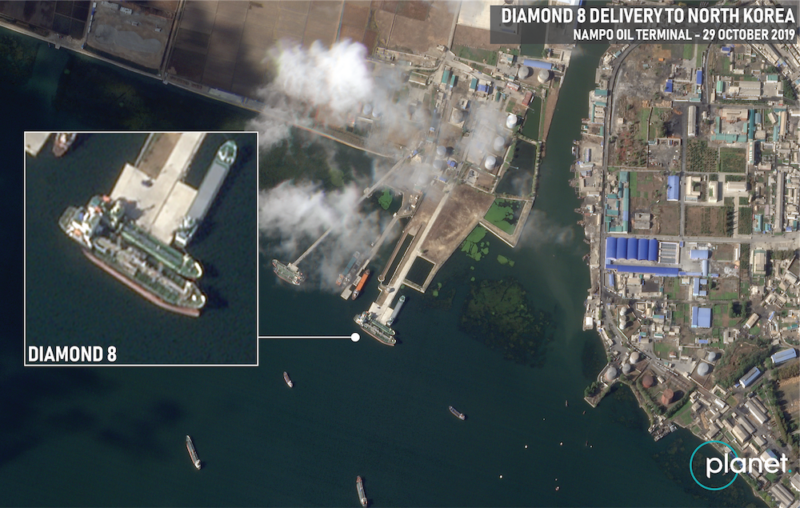How Satellite Brings Smuggling Out of the Shadows

Planet SkySat imagery of Diamond 8 delivering oil at Nampo Oil Terminal in North Korea © 2018, Planet Labs Inc. All Rights Reserved. Analysis: C4ADS, RUSI.
The longer you live, the more you realize how much of the world’s life takes place in the shadows.
They are not good places, the shadows. It’s where warlords grow rich from destroying the lives of people unlucky enough to be within their reach. It’s where human traffickers prosper and polluters hide their poisons and dictators imprison their opponents.
But the shadows are shrinking these days, and the satellite business deserves much of the credit. The explosive growth of Earth observation is bringing light to more and more of the world’s dark corners every year.
One of those places is North Korea. In 2017, North Korea shocked the world by launching tests of two ballistic missiles able to cross the Pacific and strike the U.S. One just missed hitting a commercial passenger flight headed for Tokyo.
The UN Security Council slapped a severe penalty on the rogue nation: a limit on the amount of fuel and crude oil it could import. The hope was that, with no oil reserves of its own, North Korea would soon feel the pressure to change its ways.
Except it didn’t. Two years later, the country conducted no fewer than 20 missile tests. What went wrong?
There is high demand for black market fuel from East Asia. Price differences between nations make it profitable to buy low in one place and sell high in another – if you can do it without getting caught. But with oil traders operating in the shadows, it’s impossible to stop the trade or even slow it down.
Or is it? A British charity, the Royal United Services Institute, decided to try.
The Institute turned for help to Planet and its satellite imagery. The Institute then worked with global security nonprofit C4ADS to review hundreds of images from Planet’s global archive. That painstaking work identified at least 100 oil deliveries that North Korea failed to report to the UN. Overall, the Institute estimated that North Korea imported four times more fuel in a single year than it should have.
Planet operates about 200 satellites in Low-Earth Orbit (LEO). Together, they take pictures and download images of the entire Earth’s landmass every day. Those images proved key to uncovering smuggling in action. They showed big tankers docked in East Asian nations where they legally bought fuel. Out at sea, the ships rendezvoused with smaller tankers and transferred the fuel to them for delivery to North Korean ports, in violation of the law.
Using Planet’s high-resolution images, the Institute was able to identify individual ships. The work resulted in a report called Black Gold, which found that North Korea was engaging organized criminal networks and participating in a regional fuel smuggling market in violation of international sanctions.
News stories followed, including coverage by the New York Times, bringing attention to the United Nations investigators – and North Korea found it harder and more expensive to smuggle its way to success.
Satellite can’t stop what takes place in the shadows. Only people on the ground can do that, and easy solutions are nowhere to be found. But seeing into the darkness is a first step toward bringing things into the light.
 Robert Bell is executive director of Space & Satellite Professionals International. SSPI produces the Better Satellite World campaign, which dramatizes the immense contributions of space and satellite to life on Earth. More at www.bettersateliteworld.com.
Robert Bell is executive director of Space & Satellite Professionals International. SSPI produces the Better Satellite World campaign, which dramatizes the immense contributions of space and satellite to life on Earth. More at www.bettersateliteworld.com.